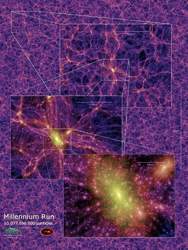Simulating the entire Universe within a computer made from bits of the Universe
Friday, June 03, 2005 → by Danieru
"Scientists have recreated a vast segment of the universe inside a computer and written a brief history of time, black holes and galaxy formation.But where, I ask, do simulation and reality differ? Where, in fact, do they diverge? Of course on this scale the 25 million megabytes can only hope to come so far in 'replicating' reality, but keep adding to that (the updated version of Moores Law states that the amount of memory available in a certain space on a microchip doubles every 18 months) and when do we have the capacity to fully model the universe? When could we exceed it?
The Millennium Simulation - the biggest exercise of its kind - required 25 million megabytes of memory. But it tracked the 14bn-year history of creation in months and now offers a tool to explore mysterious events in galaxies far away and long ago.
"It is the biggest thing we have ever done," said Carlos Frenk of the University of Durham. "It is probably the biggest thing ever in computational physics. For the first time we have a replica universe which looks just like the real one. So we can now for the first time begin to experiment with the universe.
"Unlike people who study human behaviour, who can study many humans, cosmologists have been stuck with only the one universe. Well, from today we have more than one.""
The metaphysical questions this raises are just too far and wide to be discussed in one blog entry. Has the Universe itself evolved to a level where a competent model of itself can be formed from itself? Did that sentence give you a headache? I've needed an excuse to blog about reality, simulation and perception for a while. Here's my chance. Watch this space...
Check out the quoted full article at this link or check out a slightly different take here
Pictures, movies and further info about the Virgo project can be found at their website, here
Categories: Reality, simulacrum, Science, News, Humanity, Physics, Philosophy
|
|

 Links
Links Subscribe via RSS!
Subscribe via RSS!


 Via Email
Via Email


With the boundary conditions of the bang bang yet a mystery (perhaps the LHC will help us probe closer to the initial planck time limit) these simulations are adjusted empirically to approximate distributions of mass AS WE ALREADY OBSERVE them. Can we learn a little more than we did, undoubtedly ... Does it shake notions of reality, simulation and perception ? pretty far from it
July 29, 2008 12:47 AM
Post a Comment